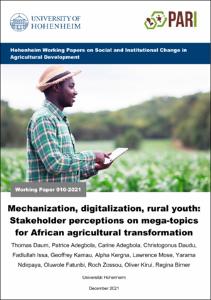Daum, Thomas; Adegbola, Ygué Patrice; Adegbola, Carine; Christogonus, Daudu; Issa, Fadlullah; Kamau, Geoffrey; Kergna, Alpha O.; Mose, Lawrence; Ndirpaya, Yarama; Fatunbi, Oluwole A.; Zossou, Roch C.; Kirui, Oliver; Birner, Regina: Mechanization, digitalization, rural youth: Stakeholder perceptions on mega-topics for African agricultural transformation. Hohenheim: University of Hohenheim, 2021. In: Hohenheim Working Papers on Social and Institutional Change in Agricultural Development, 010-2021.
Online-Ausgabe in bonndoc: https://hdl.handle.net/20.500.11811/10893
Online-Ausgabe in bonndoc: https://hdl.handle.net/20.500.11811/10893
@techreport{handle:20.500.11811/10893,
author = {{Thomas Daum} and {Ygué Patrice Adegbola} and {Carine Adegbola} and {Daudu Christogonus} and {Fadlullah Issa} and {Geoffrey Kamau} and {Alpha O. Kergna} and {Lawrence Mose} and {Yarama Ndirpaya} and {Oluwole A. Fatunbi} and {Roch C. Zossou} and {Oliver Kirui} and {Regina Birner}},
title = {Mechanization, digitalization, rural youth: Stakeholder perceptions on mega-topics for African agricultural transformation},
publisher = {University of Hohenheim},
year = 2021,
month = dec,
series = {Hohenheim Working Papers on Social and Institutional Change in Agricultural Development},
volume = 010-2021,
note = {Agricultural mechanization, digital agriculture, and rural youth engagement are three megatrends occupying policymakers focused on agricultural transformation across Africa. Each of these topics is associated with debates on opportunities and risks and appropriate policy actions. While the contested nature of these debates becomes visible in (international) research discourses and policy fora, little is known about the viewpoints of local stakeholder groups on the national level. This can undermine policy-making, leading to “wrong” policies or policies that are not prioritized by local stakeholders, which, in turn, can undermine the implementation of such policies on the ground. This paper explores the viewpoints of 195 stakeholders from the public, private and third sectors (civil society) as well as from development partners and research bodies in four African countries, namely, Benin, Kenya, Nigeria, and Mali. The results suggest that the stakeholders perceive a need for agricultural transformation using mechanization and digital tools. However, they also perceive risks that have to be addressed. The results also reveal some hitherto neglected aspects. Examples include the role of animal traction as part of agricultural mechanization strategies and the continued appeal of state-led mechanization – despite the perception that such strategies do not work. Regarding digital agriculture, the stakeholders expressed high hopes – which have yet to materialize - but also concerns about a digital divide. Gender, age, and education influence the viewpoints on some topics, but not on others. Paying more attention to the perspectives of local stakeholder groups will help to choose and design the most promising policies and ensure their implementation on the ground.},
url = {https://hdl.handle.net/20.500.11811/10893}
}
author = {{Thomas Daum} and {Ygué Patrice Adegbola} and {Carine Adegbola} and {Daudu Christogonus} and {Fadlullah Issa} and {Geoffrey Kamau} and {Alpha O. Kergna} and {Lawrence Mose} and {Yarama Ndirpaya} and {Oluwole A. Fatunbi} and {Roch C. Zossou} and {Oliver Kirui} and {Regina Birner}},
title = {Mechanization, digitalization, rural youth: Stakeholder perceptions on mega-topics for African agricultural transformation},
publisher = {University of Hohenheim},
year = 2021,
month = dec,
series = {Hohenheim Working Papers on Social and Institutional Change in Agricultural Development},
volume = 010-2021,
note = {Agricultural mechanization, digital agriculture, and rural youth engagement are three megatrends occupying policymakers focused on agricultural transformation across Africa. Each of these topics is associated with debates on opportunities and risks and appropriate policy actions. While the contested nature of these debates becomes visible in (international) research discourses and policy fora, little is known about the viewpoints of local stakeholder groups on the national level. This can undermine policy-making, leading to “wrong” policies or policies that are not prioritized by local stakeholders, which, in turn, can undermine the implementation of such policies on the ground. This paper explores the viewpoints of 195 stakeholders from the public, private and third sectors (civil society) as well as from development partners and research bodies in four African countries, namely, Benin, Kenya, Nigeria, and Mali. The results suggest that the stakeholders perceive a need for agricultural transformation using mechanization and digital tools. However, they also perceive risks that have to be addressed. The results also reveal some hitherto neglected aspects. Examples include the role of animal traction as part of agricultural mechanization strategies and the continued appeal of state-led mechanization – despite the perception that such strategies do not work. Regarding digital agriculture, the stakeholders expressed high hopes – which have yet to materialize - but also concerns about a digital divide. Gender, age, and education influence the viewpoints on some topics, but not on others. Paying more attention to the perspectives of local stakeholder groups will help to choose and design the most promising policies and ensure their implementation on the ground.},
url = {https://hdl.handle.net/20.500.11811/10893}
}






